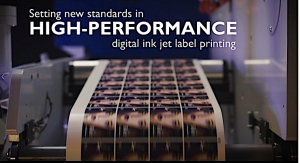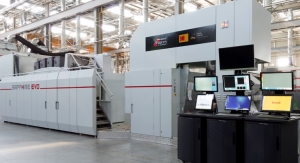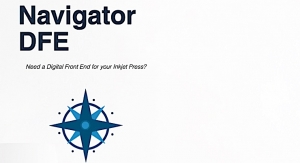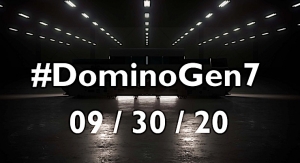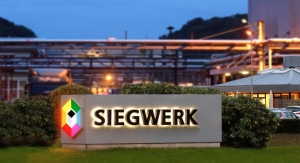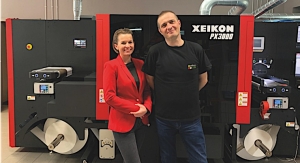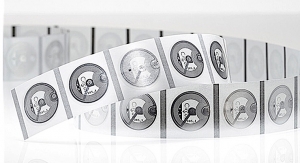05.14.20
Siegwerk, a provider of printing inks for packaging applications and labels, and APK AG, a specialist in the production of high-quality plastic recyclate from packaging waste, successfully completed de-inking trials of twofold printed LDPE-films. The strategic cooperation of the two companies, which started in October 2019, contributes its first ground breaking insights to facilitating the efficient recycling of flexible packaging applications.
"Design for recycling – ideally enabling product to product recycling – is crucial to closing the loop for flexible packaging. For Siegwerk this means providing innovative printing inks and lacquers, which facilitate high-quality recycling – for example by allowing easy de-inking while keeping full performance during the use phase," says Alina Marm, Head of Circular Economy Hub at Siegwerk.
Printing inks play a key role in the manufacture of plastic packaging. They are vital for the appearance and functionality of the packaging. But they also represent a major challenge when it comes to manufacturing a plastic recyclate of sound quality from post-consumer packaging waste. ‘The goal of a quality-driven recycling process is to create a recyclate, which is as transparent as feasible and which can once more be reused in packaging applications. Successful de-inking is essential‘, elaborates Klaus Wohnig, CEO of APK AG.
In spring 2020 the Research- and Development unit of APK AG tested a number of LDPE-film samples, which had been printed twofold with yellow, red, black and blue inks of Siegwerk. The test series aimed to establish, whether APK AG’s solvent-based recycling technology Newcycling could fully remove Siegwerk’s inks from the polymer matrix. The film samples were treated with the Newcycling solvent and dissolved. The obtained polymer solution still contained printing ink-components. The dispersed inks were then removed with a filter unit explicitly designed for the process step of de-inking, featuring a very high selectivity level.
The de-inking tests of the red, black and blue samples produced a "near-virgin" transparency, Siegwerk says. In case of the film printed with yellow ink a marginal yellowness remained after the treatment. "We consider the entire life cycle of the packaging - from design, to use phase and finally recycling. We are very pleased that printing inks from Siegwerk have proven to be suitable for solvent-based recycling processes. We have mastered a much-discussed challenge for efficient recycling of flexible packaging," says Ralf Leineweber, Head of Global Technology Development at Siegwerk.
"In line with the principles of the EU Green Deal and the new Circular Economy Action Plan our Newcycling-technology aims at closing cycles for flexible packaging solutions that are deemed ‘un-recyclable’ up to now. We aspire to combine environmental benefits of recycling with high-quality performance of the recyclate," explains Hagen Hanel, Head of Plastics Recycling Innovation Center at APK AG.
Newcycling comprises a step of physical pre-treatment of plastic waste, which is also done in conventional mechanical recycling processes. After this APK AG adds the solvent-based process step, which purifies the polymer from additives – such as printing inks from the cooperation partner Siegwerk. The result is a virgin-like recyclate. In contrast to chemical recycling the polymer’s molecular structure stays intact the entire process. Consequently, the energy that has been invested into polymerization is preserved.
"Design for recycling – ideally enabling product to product recycling – is crucial to closing the loop for flexible packaging. For Siegwerk this means providing innovative printing inks and lacquers, which facilitate high-quality recycling – for example by allowing easy de-inking while keeping full performance during the use phase," says Alina Marm, Head of Circular Economy Hub at Siegwerk.
Printing inks play a key role in the manufacture of plastic packaging. They are vital for the appearance and functionality of the packaging. But they also represent a major challenge when it comes to manufacturing a plastic recyclate of sound quality from post-consumer packaging waste. ‘The goal of a quality-driven recycling process is to create a recyclate, which is as transparent as feasible and which can once more be reused in packaging applications. Successful de-inking is essential‘, elaborates Klaus Wohnig, CEO of APK AG.
In spring 2020 the Research- and Development unit of APK AG tested a number of LDPE-film samples, which had been printed twofold with yellow, red, black and blue inks of Siegwerk. The test series aimed to establish, whether APK AG’s solvent-based recycling technology Newcycling could fully remove Siegwerk’s inks from the polymer matrix. The film samples were treated with the Newcycling solvent and dissolved. The obtained polymer solution still contained printing ink-components. The dispersed inks were then removed with a filter unit explicitly designed for the process step of de-inking, featuring a very high selectivity level.
The de-inking tests of the red, black and blue samples produced a "near-virgin" transparency, Siegwerk says. In case of the film printed with yellow ink a marginal yellowness remained after the treatment. "We consider the entire life cycle of the packaging - from design, to use phase and finally recycling. We are very pleased that printing inks from Siegwerk have proven to be suitable for solvent-based recycling processes. We have mastered a much-discussed challenge for efficient recycling of flexible packaging," says Ralf Leineweber, Head of Global Technology Development at Siegwerk.
"In line with the principles of the EU Green Deal and the new Circular Economy Action Plan our Newcycling-technology aims at closing cycles for flexible packaging solutions that are deemed ‘un-recyclable’ up to now. We aspire to combine environmental benefits of recycling with high-quality performance of the recyclate," explains Hagen Hanel, Head of Plastics Recycling Innovation Center at APK AG.
Newcycling comprises a step of physical pre-treatment of plastic waste, which is also done in conventional mechanical recycling processes. After this APK AG adds the solvent-based process step, which purifies the polymer from additives – such as printing inks from the cooperation partner Siegwerk. The result is a virgin-like recyclate. In contrast to chemical recycling the polymer’s molecular structure stays intact the entire process. Consequently, the energy that has been invested into polymerization is preserved.


